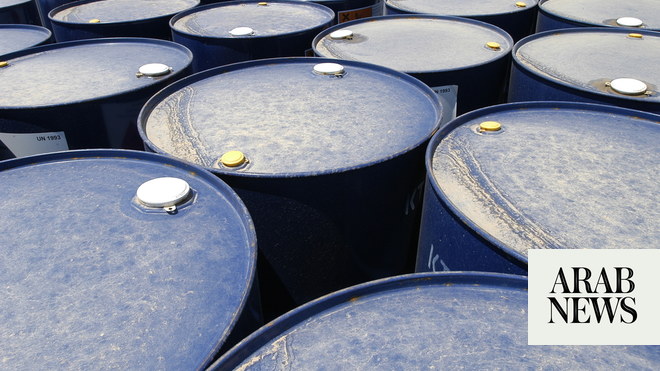
U.S. gasoline prices predicted to fall 12 percent through the end of the year
IEA warns crude demand set to weaken for rest of year, while OPEC maintains forecasts
LONDON: US President Joe Biden’s calls for OPEC+ to pump more oil may be short-lived as political pressure eases along with gasoline prices over the coming months.
US gasoline prices rose 2.4 percent in July from the previous month, taking their 12-month advance to 41.8 percent, according to inflation data. The daily national average price at the pump was $3.19 on Aug. 11.
However, that price is set to decline by almost 12 percent to an average of $2.82 a gallon in the fourth quarter, according to US government forecasts. The continued progress of the Delta coronavirus variant could lead to further demand destruction and an even bigger drop.
Global oil demand is expected to grow slower than previously forecast this year and may lead to surplus supply in 2022 as the spread of the delta variant prompts lockdowns in major consuming countries, the International Energy Agency said Thursday.
Demand surged in June as mobility increased in North America and Europe. But it “abruptly reversed course” in July as the Delta variant undermined deliveries in China, Indonesia and other parts of Asia, the IEA said in a monthly report.
In contrast, OPEC on Thursday stuck to its prediction of a strong recovery in world oil demand in 2021 and further growth next year, saying it expects demand to rise by 5.95 million barrels per day (bpd) this year, or 6.6 percent, unchanged from last month’s forecast.
“The global economy continues to recover,” OPEC said in the report. “However, numerous challenges remain that could easily dampen this momentum. In particular, COVID-19-related developments will need close monitoring.”
Brent crude fell 0.4 percent to $71.35 a barrel at 11:51 a.m. in London. It closed near a two-year high at $76.33 a barrel on July 30.
“Production cuts made during the pandemic should be reversed as the global economy recovers in order to lower prices for consumers,” Biden said Wednesday at the White House.
However, OPEC+ agreed last month to increase supply by 0.4 million barrels per day each month from August through December for a total of 2 million bpd.
"This call from the White House is a bit of cognitive dissonance given the Biden Administration’s strong environmental advocacy, but it shows again how gasoline prices remain top of mind in American energy politics," Herman Wang, managing editor, OPEC/Middle East news at S&P Global Platts, told Arab News. "It’s also a reminder that OPEC and its allies retain significant influence in the market."
"In practical terms, the US’ petrodiplomacy may be a bit of verbal theatre, but OPEC’s own analysis today shows that its supply is well under the volumes needed to balance the market," said Wang. "Imminent action by OPEC+ is unlikely, with many members having already committed to September export volumes, but its messaging at its Sept. 1 meeting is sure to be closely parsed by US officials."
The administration’s move was likely timed to coincide with the inflation announcement, Height Capital Markets analyst Benjamin Salisbury told Bloomberg News.
“The rising inflation narrative – especially fuel prices – is the number one risk to Biden’s infrastructure, American Jobs Plan and American Families Plan agendas and the Democrats’ re-election prospects,” Salisbury said.












